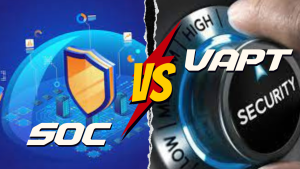
In the fast-paced world of technology, choosing a career path can be a daunting task. The decision between a System on Chip (SoC) career and one in Vulnerability Assessment and Penetration Testing (VAPT) is especially critical, as it involves a blend of personal interests, skills, and long-term career goals. This article aims to guide you through the intricacies of each field, helping you make an informed decision that aligns with your aspirations.
1. Unveiling SoC
SoC Overview
System on Chip (SoC) refers to the integration of various components such as processors, memory, peripherals, and interfaces into a single chip. It is a crucial element in electronic devices like smartphones, IoT gadgets, and embedded systems, playing a pivotal role in technological advancements.
Skills Essential for SoC
Embarking on a career in SoC demands a profound understanding of hardware design, digital and analog electronics, embedded systems, and proficiency in programming languages like Verilog or VHDL. Additionally, skills in system architecture, low-level programming, and hardware debugging are imperative for success.
SoC Career Opportunities
SoC engineers find their niche in semiconductor manufacturing, electronics design, and product development. Key roles encompass SoC design engineer, hardware engineer, or firmware engineer, offering a diverse array of opportunities.
2. Unraveling VAPT
VAPT Overview
Vulnerability Assessment and Penetration Testing (VAPT) involve the meticulous scrutiny and identification of vulnerabilities in computer systems, networks, and applications. Penetration testing, a proactive approach, empowers ethical hackers to simulate cyberattacks, pinpointing and rectifying security weaknesses.
Skills Crucial for VAPT
Foraying into VAPT necessitates a robust grasp of cybersecurity concepts, networking, operating systems, and proficiency in programming languages. Adeptness in tools employed for vulnerability scanning and penetration testing, coupled with knowledge of security standards and protocols, defines a successful VAPT professional.
VAPT Career Opportunities
In high demand across diverse industries like IT consulting, cybersecurity firms, financial institutions, and government agencies, VAPT professionals assume pivotal roles such as penetration tester, security consultant, or ethical hacker.
3. Considerations for Choosing
1. Interests
If the allure of working with hardware, designing electronic systems, and immersing yourself in low-level programming resonates with you, SoC might be your preferred path. Conversely, if your passion lies in cybersecurity, ethical hacking, and safeguarding digital assets, VAPT could be your calling.
2. Skills
Evaluate your existing skill set and align it with the demands of each field. If you relish problem-solving, possess an eye for detail, and stay abreast of the latest security threats, VAPT might be your forte. Alternatively, if you boast a background in electrical engineering or computer architecture, SoC might be the better fit.
3. Industry Trends
Ponder upon the current and future demand for professionals in each domain. The escalating threats in cybersecurity make VAPT skills highly coveted, while the burgeoning IoT and electronic devices sector drive the demand for SoC engineers.
Conclusion: Your Unique Trajectory
In conclusion, the optimal career choice hinges on your individual preferences, existing skills, and career aspirations. You may discover opportunities to amalgamate both fields, as cybersecurity proves indispensable in the development and deployment of numerous embedded systems. The journey ahead is yours to chart, laden with possibilities and opportunities tailored to your unique trajectory. Remember, the key lies in aligning your passion with the ever-evolving landscape of technology.
